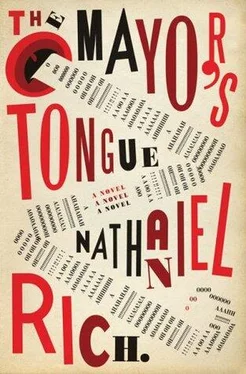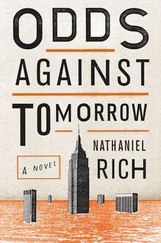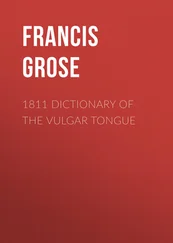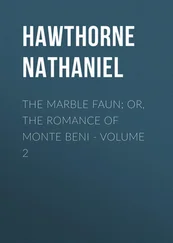Children! he chirped. Children! he chirped louder, this time in the Triestine dialect. The urchins turned and regarded Lang with mute apprehension: a man no larger than them, bumbling and trembling, with a puckered neck quivering pink beneath his mustached mouth. A voice that sounded like a deflating balloon. The boy kicked his feet together; the girl stuck out her tongue and put a grimy hand on her hip. Alice, giggling, tried to lead Lang past the children before he got himself hurt.
When the children noticed Alice they jumped as if they had seen a corpse. The ragball dropped with a squish from the boy's hand.
"Xe el cinciut," said the girl, pointing at Alice. The boy's eyes grew blurry with tears.
"El cinciut," they said. "El cinciut!"
And they ran away. Alice was mortified.
"Don't be upset," said Lang. He explained:
"It's an old Triestine superstition that dates back to the medieval age. Many young Triestini still go for it. They believe in a demon they call a 'cinciut' that lives in the Carso and descends upon the city when the bora wind blows with its nightmarish gusts. The cinciut is a kind of incubus, who feasts on any children playing out at night. In February, during the high-wind season, the cinciuts rush down from the Carso, rattling through the forests above the city. It's a nursery tale told to children to make them stay inside during the bora, so they don't get hurt outside.
"The only talisman against the cinciut is a dead sparrow. There's a line in Proverbs that reads: Like a fluttering sparrow, an undeserved curse does not come to rest. So if you throw a sparrow at a cinciut, you're protected. It's just a children's game, nothing to take seriously."
But this absurd encounter seemed to return Alice to her previous melancholy state. She pitter-pattered up the cellar stairs earlier and earlier every morning. It was clear she wasn't sleeping. Her hair, that gorgeous russet hair, coiled together, scraggly and dry. She moved with uncertainty, and declined Lang's invitations to explore the city, or even accompany him on his errands. When he asked what was wrong, she admitted she felt unsettled and preoccupied, though she didn't know why. But she'd see her old friends most days, and she never allowed herself to be anything but her old glimmering self around them. She would jump on the back of Marco's Vespa and they would plow out of Via San Nicolò, sending the pigeons aloft and the miserable stray cats limping back into their alleys. She grotto-hopped with sly Kasia, the butcher's black-eyed daughter: they went to the nightclubs down the coastline and swam off the rock beaches. With Poldi, the coffeemaker, she picked olives on a sunny hillside just over the Slovenian border. Yet every afternoon, when she came home for a nap, her face collapsed, her color drained. She would tell Lang briefly about her day in a tone of false cheerfulness and then slink down to her room.
"What do you think was upsetting her?" asked Eugene, afraid of how Lang might respond.
"I think she might have been worried about her father's health and fragile condition. Other times I felt that she resented having to take care of him, and didn't know what she wanted to do with herself, now that she was an adult. But I was never certain. One day, I decided to approach her about it and have a conversation. But before I could, she got better."
"What happened?" asked Eugene, suddenly hopeful. "Did she. . did she get one of my letters?"
"No," said Lang. "Connie showed up."
Alice, said Lang, had been walking across the wide graphite spread of Piazza Unità, toward the sea. At the edge of the piazza, past the boardwalk, a quartz-white stairway led down right into the water, so that the sea seemed one vast swimming pool. Above the horizon before her, a slim crescent moon sliced apart the pink sky. She liked to sit on the third step, so the water could tickle her ankles. To her left extended a long pier, the Molo Audace, lined with tinselly bronze streetlamps. By dusk the water level rose so high that the assembled crowd of horizon-watchers on the pier seemed to be standing on nothing more substantial than the sea itself. The far end of the pier was tacitly reserved for couples, who lingered in the day's final light, outlasting the sun by slow, wondrous minutes.
But on this midsummer afternoon it was not quite dusk. The children, free from school and hungry for dinner, their mouths like coin slots, wandered in grubby, querulous packs. Alice told Lang that she had immediately noticed among these boys the one who had yelled at her in the ghetto a week earlier. She watched helplessly as he spotted her, and then called out to his friends. The children ran over, forming a cautious semicircle around her — though not too close, fearing, perhaps, that she might jump after them with gnashing teeth.
Something splashed into the water just in front of her and then floated up, bobbing lifelessly in the tide. Gradually, herky-jerky, the tide pulled it toward her, until she could make out what it was. The sparrow's head had been twisted down into its breast, its neck secreting an oily iridescent film. There was a spurt of high-pitched laughter and the scampering of two dozen little feet. She felt a crackling in the small of her back and began to grow faint. El cinciut, the children whispered. El cinciut. It was a chant. They shuffled closer, their confidence surging, until they were nearly upon her, a midget mob of squirrelly faces and small angry hands with chewed fingernails.
A slow roar rent the sky. One of the girls, a blond tomboy wearing corduroys, fell to her knees in preemptive surrender. A boy grabbed his mouth with both hands and screamed hoarsely into them, and another boy promptly lay down in a fetal position.
A man — or something resembling a man, only much larger— stood planted on the boardwalk between Alice and the children. His piston legs, themselves like two small children, supported a mighty torso heaving with rage and adrenaline. Arms shot out like distended pythons, waving heavy red fists. He had a warrior's face: a sharp, muscular jaw thick with a grizzled beard; a broken nose shaped like a scythe; hawkish, cavernous eyes; and a sun-bronzed forehead that, like a rampart, supported a mountainous skull, from which there dangled a rich thicket of curly orange-white locks — for he was, despite his ferocious vitality, an elderly man. As he spoke to the children, he swept his arm across the horizon, a gesture that implicated them all, and had the incidental effect of making them shudder in unison. They seemed too terrified to respond, run away, or stand still; several of them shivered uncontrollably.
"She is not a cinciut," shouted the man, in thick Triestine dialect.
He unleashed another booming, stentorian roar. "It's ME! I'm the demon you fear. I am the commander of the cinciuts, and I will send them down to devour your malnourished skulls. Now, run off, or I will tear off your heads and force-feed them to your destitute whorish mothers."
The children sprinted off hysterical in every direction, tripping and falling. One boy ran straight into the fence that surrounded the Piazza Unità's fountain, fell on his back, and lay motionless for a moment. Then he stood up and, grasping one crooked arm, slithered off in the opposite direction. Another boy jumped into the sea and began dog-paddling in the direction of Venice. The great man turned to face Alice.
"I'm so sorry, little darling. I hope I haven't disturbed you." He spoke in English, and in a genteel tone, unrecognizable from his previous tirade. He smiled courteously as he spoke. "I hate to see people act cruelly to young, innocent women, especially those traveling abroad. You are American, aren't you?"
Alice nodded, her gray eyes gaping in amazement at the physical oddity before her. The man helped her up, nearly lifting her off the ground entirely.
Читать дальше












